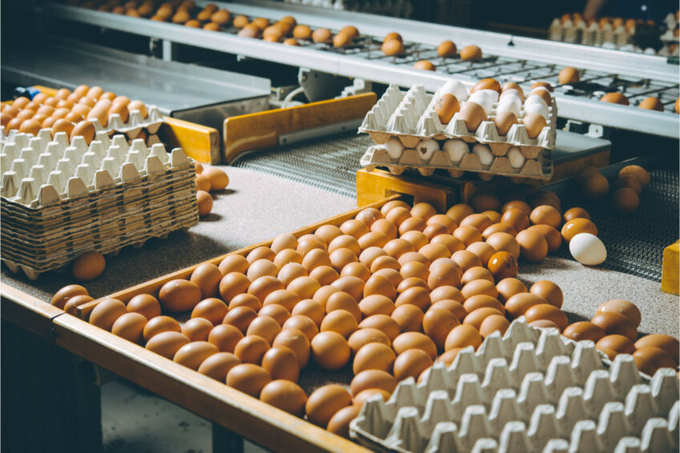November 25, 2025 | 07:40 GMT +7
November 25, 2025 | 07:40 GMT +7
Hotline: 0913.378.918
November 25, 2025 | 07:40 GMT +7
Hotline: 0913.378.918
The specter of price hikes and supply disruptions, reminiscent of the 2023 egg crisis, looms large. In response, Russian poultry farmers are calling for the antimonopoly regulator to intervene.

Among the 40 largest poultry farms accounting for 90% of deliveries to the Russian market, only 30% have long-term contracts with retail chains. Photo: Canva
The Russian Union of Poultry Farmers, Roptitsesoyuz, has sent a letter to the Federal Antimonopoly Service demanding a limit on retail chains’ egg markups to 10%. The rationale behind the initiative is likely to force retailers to sign long-term contracts with their suppliers.
The 2023 egg crisis left a lasting impact on the Russian market, with the price of eggs skyrocketing by a staggering 61.4%. This surge far outpaced any other food commodity, as per official statistics. The average food price increase in the country was a mere 1.5%.
Prices stabilised in early 2024, but in recent months, they started to increase again, and Rosptitsesoyuz largely blames retailers for the dynamics. During the first 7 months of 2024, the average retailer’s markup stood at 20%, reaching 25.9% in July. In particular cases, this figure could be as high as 30-35%, the organisation reported.
As explained by Galina Bobyleva, general director of Rosptitsesoyuz, retail chains are largely preferred to sign short-term contracts with egg suppliers. She added that this adds uncertainty for egg farms, as they feel less confident about their future. Short-term contracts also allow retailers to set a higher markup.
As estimated by Rosptitsesoyuz, among the 40 largest poultry farms accounting for 90% of deliveries to the Russian market, only 30% have long-term contracts with retail chains. The rest primarily rely on short-term deals signed following competitive bidding procedures. Under this mechanism, the contracts are usually signed for only 1-2 weeks, and the egg farms get the price 15% lower than under a long-term contract.
Retailers are generally unwilling to switch to long-term contracts since there is still no confidence that farmgate prices will remain stable.
Dmitry Vostrikov, executive director of the Russian food manufacturers union, Rusprodsyouz, under the long-term agreement, the hardest part is to negotiate on the mechanism of price adjustments, in case of market turbulence.
There are other reasons why food retail is not rushing to jump into long-term contracts.
Last year showed that long-term contracts are effective only if they are fulfilled, stated Igor Karavaev, chairman of the Russian Association of Retail Companies. According to him, during the 2023 egg crisis, suppliers reduced deliveries under existing long-term contracts by 30% of the volume of orders from retail chains. Retailers struggled to fill the shelves by urgently seeking additional quantities during tenders, he added.
(PW)

(VAN) Brazil's COP30 presidency pushed through a compromise climate deal on Saturday that would boost finance for poor nations coping with global warming but that omitted any mention of the fossil fuels driving it.

(VAN) Poultry farmers in the UK have been warned that they could face one of the worst winters yet for bird flu.

(VAN) Prices of main-crop paddy have risen sharply, with jasmine rice hitting 16,100 baht per tonne — the highest level in years.

(VAN) In Brazil, FAO unveiled a series of reports and initiatives showing how sustainable agrifood systems are a solution to the climate crisis.

(VAN) With names like neodymium and dysprosium, rare-earth elements sound exotic — and their perceived scarcity has only added to the mystique.

(VAN) In a new study published in Trends in Biotechnology, researchers used a gene-editing technology called CRISPR to increase a fungus's production efficiency and cut its production-related environmental impact by as much as 61%- all without adding any foreign DNA.

(VAN) A top official in Beijing’s Cop delegation says China is committed to clean energy – but US’s absence is a problem.